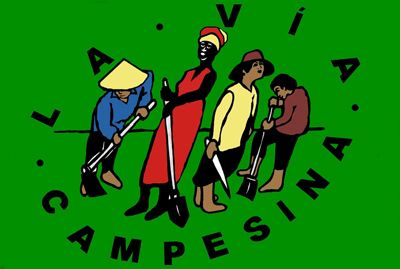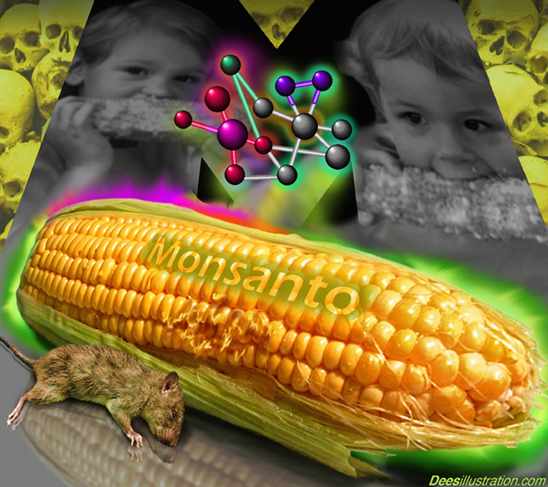Who really benefits from GM crops?
Hits: 328930 June 2011
'Agroecology' offers real solutions to world hunger after decades of GM hype
 La Via Campesina (the Peasant's Way) is emerging as a potentially powerful international movement (www.viacampesina.org), mobilizing resistance against the GM corporations, which have consolidated their agro-chemical companies into just five major global players; Monsanto, Bayer, BASF, Syngenta and Dupont.
La Via Campesina (the Peasant's Way) is emerging as a potentially powerful international movement (www.viacampesina.org), mobilizing resistance against the GM corporations, which have consolidated their agro-chemical companies into just five major global players; Monsanto, Bayer, BASF, Syngenta and Dupont.
A recent report by the Friends of the Earth [1] has highlighted the struggle between the two forces for control of the seeds. On one side are the 1.5 million members of the Via Campesina, who are demanding food sovereignty or the right to grow healthy food from local, time-honoured seeds. Opposing them are the mega-corporations, which have gained so much power through patents on GM crops, seeds and pesticides.
Spain is the last bastion of GM crops in Europe. Monsanto has cause for concern that even Spain is back-tracking as the Basque and Catalonia regions prepare to go GM-free, along with the neighbouring Canary Islands. Monsanto has urged Spanish Embassy officials to step up pressure on Brussels, ‘Because if Spain falls the rest of Europe will follow.’[1]
Europe has already spoken on GM crops with 61% of the population against them and 23% less GM crops grown in the past two years. Monsanto’s MON810 maize is banned in France, Germany, Austria, Greece, Luxembourg and Bulgaria, where there is a total GM ban. Switzerland has a GM moratorium until 2013.
Things could change again now that the European Patent Office has decided that the biological breeding of plants and animals can no longer be a patented process.
Growers against corporations
Via America is fighting to protect farmers in the US and Canada, where 64% of the world's GM crops are grown, from the disappearance of local seed markets and the rocketing price of GM seeds. Over the years, corporations have been boosting profits by suing thousands of farmers for millions of dollars in royalties on GM seeds windblown onto their fields.
In 2010 Texan farmers turned the tables by forcing Bayer to compensate them for contaminating their GM-free rice crops with GM rice seed. It was the farmers’ seventh win since 2006. One co-operative company, Riceland Foods, was awarded a total of $136.8m
In Argentina GM soybean monocultures are destroying the health of communities where some 50% of the harvest goes to feeding livestock, and for biofuels, forcing grain price hikes and reducing balanced diets for people. Local residents in Santa Fe have legally prevented Monsanto’s Roundup herbicide, linked to cancer, DNA damage and miscarriages, being sprayed anywhere near homes.
Dr Andreas Carrasco, Chief Scientist of National Council for Science and Technology in Argentina was intimidated and his colleagues beaten up after their tests on frogs and chicken embryos confirmed health defects caused by Roundup [2]. He is worried about the sheer amount of soybean crops growing on over half the total of cultivated land. ‘From the eco-toxilogical point of view, whatever is happening in Argentina is a massive experiment,’ he said.
New pathogen from GM toxins
 Monsanto’s Roundup Ready (RR) crops have now been linked to a new pathogen discovered by a team of scientists led by plant pathologist Dr Don Huber, emeritus professor at Purdue University. It was first found in soybean meal and corn infected plants fed to livestock.
Monsanto’s Roundup Ready (RR) crops have now been linked to a new pathogen discovered by a team of scientists led by plant pathologist Dr Don Huber, emeritus professor at Purdue University. It was first found in soybean meal and corn infected plants fed to livestock.
The micro-organism interacts with Glyphosate, the active compound in RR and in Roundup weed-killer. Reports of 20% infertility and 45% spontaneous abortions in infected cows have been ignored by the mainstream media. The pathogen has also been found in pigs, corn silage and distillers grain used in alcohol production. It grows well in the presence of bacteria and can wipe out healthy soil organisms.
Dr Huber warns that manganese levels are seriously deficient in RR crops inhibiting the micronutrients of plants being fed to humans and animals. He has urged Agriculture Secretary Vilsack to stop deregulating RR immediately; citing the biggest risk to human health and bee health is from the number one forage crop alfalfa. ‘What’s the urgency of Roundy Ready alfalfa?’ [3] he said.
GM toxins and bee health
France was first to ban Bayer’s GM maize and sunflower seeds coated with the neonicotinoid pesticides thought to be responsible for the mass deaths of bees in CCD (colony collapse disorder) hives. A consortium of GM seed producers led by Monsanto and Bayer tried to rescind the ban, but was caught cheating after presenting results that did not match their original data.
Italy and Germany banned neonicotinoids [several years later] in 2008 and Brazil recently banned Bayer’s ‘Liberty Link’ maize because of a lack of impact assessments. By 2009, Italy’s non-neonicotinoid maize fields were showing zero bee losses.
In the UK, the Co-Op prohibited neonicotinoids in 2009 after a lack of action by the Government and is funding an on-going, three-year study into its effects on bees’ brains. This year 74 MP’s signed an Early Day Motion (EDM1267) demanding action on neonicotinoids after a Wikileaks document in November, 2010, revealed that the US Environmental Protection Agency knows that neonicotinoids are causing harm to bees, but has no plans to suspend its use.
In April DEFRA (Department of Food and Rural Affairs) stated there is no evidence to suggest a link between bee die-offs and systemic pesticides. This is not surprising given that the Foresight report from the UK’s Chief Scientist [4] is urging the ‘sustainable intensification of agriculture’ using GM technologies.
But Dr Jeff Pettis, at the USDA's main bee research laboratory, has observed bees protecting hives by sealing off pesticide-tainted pollen with sticky propolis. 'They are recognising that something is wrong with the pollen and encapsulating it. Bees would not normally seal off pollen.' [5]
However, banning neonicotinoids outright will not be easy because Bayer sits on the board of the International Committee on Plant-Bee Relationships alongside representatives of BASF and Syngenta. Syngenta and Bayer were the main sponsors of the International Seed Federation World Seed Congress held this May in Ireland. By contrast, the UK's first-ever Natural Beekeeping conference will be held in Worcestershire in August.
UK approves GM wheat trial
The industry hype that GM will feed the world has opened lucrative doors for Monsanto, which received around $23m from Bill Gates, who acquired 500,000 Monsanto shares in 2010.
In addition, Gates put $27m into cracking wheat’s genetic code. Following his recent visit to the UK, the Government, previously lukewarm, has approved a trial of wheat at Rothamsted Research in 2012.
A further $100m in grants donated by the Gates Foundation on behalf of Monsanto is an effort to capture Africa’s huge seed market and, according to FOE, to undermine the policies supporting traditional farming in Africa. This has already lead to widespread land and water grabs in the form of new colonialism. Via Campesina has responded by saying, ‘No foundation should tell a nation what to grow.’
Agroecology alleviates poverty
La Via Campesina receives modest funding from charities such as Grassroots International.[6] In Latin America, Asia, and India, the Via Campesina has adapted to climate change and local conditions by applying ecological concepts and the practical science of agroecology to conserve land and water resources and to produce more food on less land.
Agroecology is helping to break down the dominant market model that thrives on competition to produce cheap food for export, trapping people in hunger and poverty. Instead, Campesinos grow enough food to eat and trade surpluses in local markets. By diversifying food growing and distribution systems Via Campesina support local economies, employment, education and healthcare, seed saving, seed swapping and scientific research, all linking back to food secure communities.
Hans Herren is the World Food Prize Laureate (1995), President of the Millennium Institute, and the co-author of the leading international report on agriculture [7] in which 400 scientists and 200 experts have said that business as usual is no longer an option and agree with the methods of the Via Campesina.
Addressing the new All Party Parliamentary Group on Agroecology at Westminster in March, Herren said in giving corporations control of seeds, ‘We must boycott big companies because they fear that and demand labelling for what has been used and what has not been used.’
Sam Burcher is the co-author of Food Futures Now (ISIS, London, 2008). This article was first published in Caduceus Magazine www.caduceus.info
References
- Who benefits from GM Crops? An Industry built on myths. Friends of the Earth International February, 2011, no 121.
- http://www.gmwatch.eu/images/pdf/Carrasco_research_paper.pdf
- Dr Huber explains new organism http://vimeo.com/22997532
- Government Office for Science,The Future of Food and Farming, 2011. http://www.bis.gov.uk
- van Engelsdorp D, Pettis JS et al. A survey of managed honey bee colony losses in the US, fall 2009 to winter 2010. J Apicult Res 2011;50:1-10.
- Grassroots International http://www.grassrootsinternational.org/
- The IAASTD Report: Agriculture at a Crossroads 2008 www.agassessment.org/








